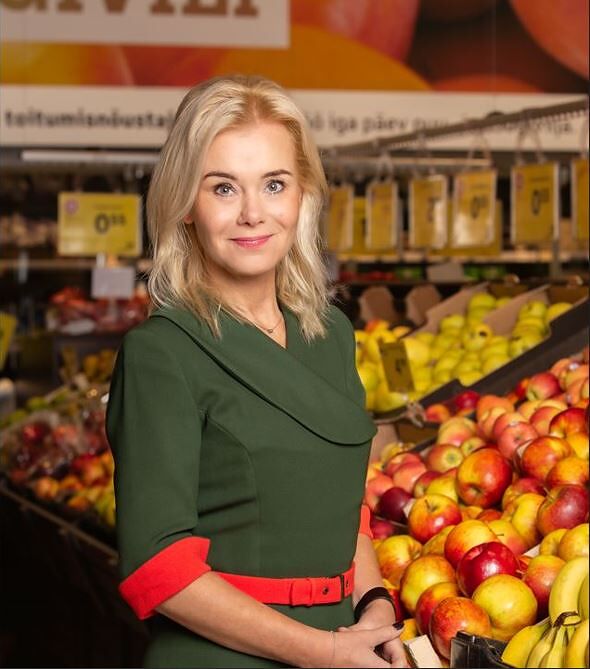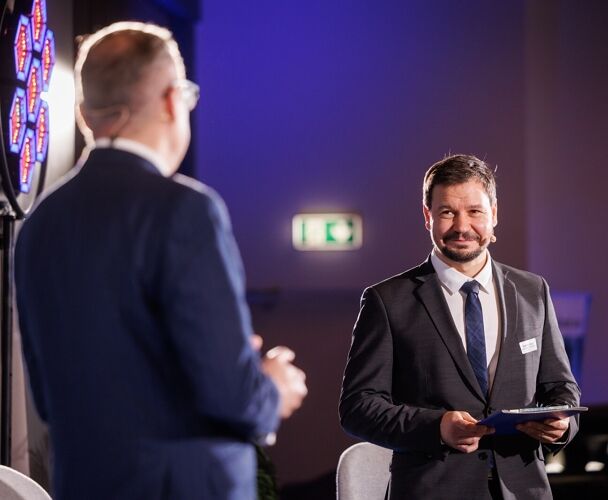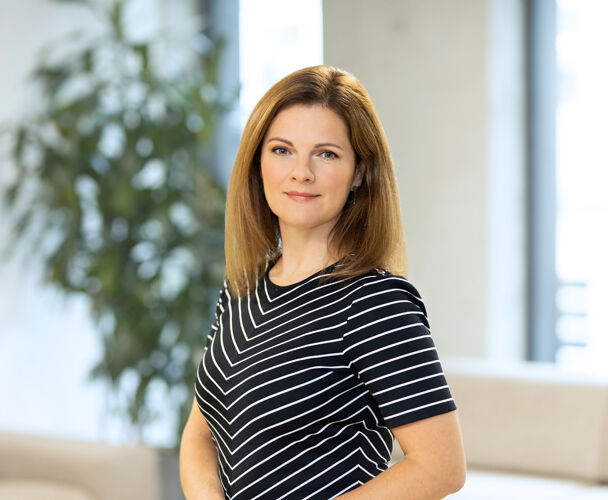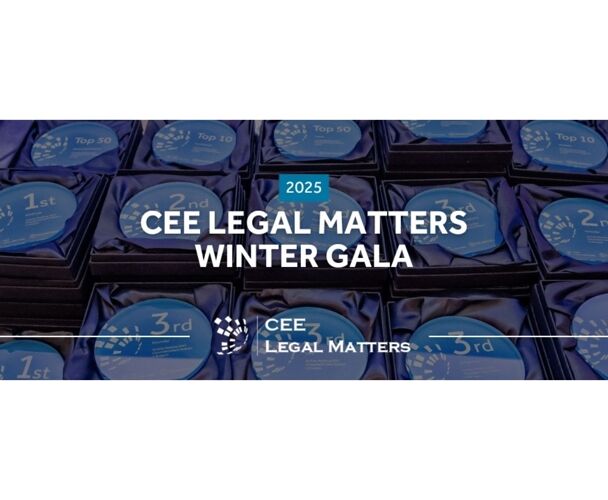On October 10th, during Impact Day, the Baltic’s Best ESG Manager was announced. The esteemed award, initiated by Esgrid and COBALT, was presented to Katrin Bats, CR Manager of Rimi Eesti Food AS.
This award was established to highlight the evolving role of sustainability managers, regardless of their specific titles within organizations. Our aim was to bring attention to this emerging profession and recognize those who are actively contributing to a more sustainable business landscape in the Baltic region.
Katrin’s outstanding leadership and commitment to advancing sustainability stood out. We had the opportunity to discuss her journey, insights on the future of ESG, and the impact of her work.
Read on to discover her perspectives.
Could you share with us what inspired you to pursue a career in sustainability and ESG management?
I have worked at Rimi for 14 years. When I started in 2010, there wasn’t much talk about sustainability, and letter combination ESG did not exist at the time 😊. However, Rimi’s parent company, ICA Group in Sweden, reported on its sustainability achievements alongside its financial results already then. So, it’s not surprising that when giving input there, it became clear that making money is important, but so are the values behind it. Therefore, I can safely say that I’ve been involved in sustainability in one way or another for the entire 14 years.
Congratulations on winning the Best Baltic Sustainability Manager Award! What do you consider your most significant accomplishment in the past years that contributed to this award?
Firstly, many thanks for the recognition! It is extraordinary that ESGRID and COBALT introduced such a title. At the same time, of course, very logical, as this field needs all-round support and recognition, especially now.
I believe my contribution was noticed because, in addition to my daily tasks, I am also socially active. Unfortunately, or fortunately, I guess I have significantly more social nerves than the average person, and I just have to react when something gives me a reason to do so. The discussion around the burden of sustainability – often focusing only on its negative aspects – led me to join the CSR Estonia board, because it felt unfair to leave the conversation at just that. I have also been a long-time volunteer on the Food Bank Council, and you’ll often see me giving lectures at universities. This motivates me because I get to share my knowledge and, above all, help others through one of the most revolutionary changes of our time.
If I had to point out just a few key projects I’ve contributed to at Rimi, they would be reducing food loss and changing the mindset around it, as well as launching Rimi’s social card in cooperation with the Ministry of Social Affairs. Both are perfect examples of initiatives where the environment, society, and the company all win.
How have you integrated sustainability into your company’s overall business strategy? What challenges did you face, and how did you overcome them?
This is a very good question, because addressing sustainability challenges is something that a CR leader cannot do alone. To succeed, you need everyone on board – not just the management, but certainly all other employees of the company. I often say my greatest achievement is that I have been able to bring a sustainable mindset to almost all employees. I remember when we first started, it was only us CR experts making suggestions for more sustainable business practices. Over time, as the message spread and the mindset shifted, we began receiving suggestions from employees at every level.
One very simple suggestion here as well, which greatly eased my work – the opportunity to present the company’s sustainability achievements alongside financial results in our annual reviews. Why it mattered, you may ask. Firstly, this signaled to the entire organization that these issues are equally important and provided a great platform for all sustainability issues. I have my CEOs at the time to thank for this opportunity.
Could you tell us about one of the most innovative or creative sustainability initiatives you’ve implemented? How has it impacted your company or the broader community?
Once again, I have to point out these two examples – reducing food loss and launching the food card.
Rimi has been donating to the Food Bank in Estonia for 14 years, and we partner with Food Banks in Latvia and Lithuania too. I remember we started with just three stores; today all the stores donate almost every day. This shift happened when reducing food waste became a real, measurable goal for the company. However, a significant turning point was the introduction of our discount sticker system for products nearing their expiration date. It is true that its success reduced the amount of food donations, but it was never our first goal as a business. By selling these expiring products, we have gained a significant amount of money, as these products sell very well. But what is more important, Rimi managed to change the image of these products` consumption. We placed them in the visible center of the store, not in a corner, and added them to the Rimi app, where customers can review them before coming to the store. I would say that these products became trendy as a result of our work. I really hope that it also sent a message to the whole society that food is precious and should not be wasted.
Secondly, I would like to highlight the Rimi social card project. This was the first time Rimi participated in such a tender. At this point, I also want to commend the state for being brave enough to undertake this journey. Previously, EU food aid was distributed through food parcels, which was very burdensome for the Food Bank, social workers and the Ministry of Social Affairs. The social card offers a dignified way for people to choose the food they need and when they need it. The results show that social cards are used almost 100 percent, and recipients buy exactly what they lacked from the food packages – fresh, everyday food. This initiative has even been recognized in Europe, and we are very proud of it!
Collaboration is key in sustainability. How did you engage with stakeholders, both inside and outside of your company, to achieve your goals?
It is true that it is difficult to achieve fundamental change alone. The employees were already mentioned before. We also talk to our suppliers constantly. Also, over the years, we have partnered with organizations from many different sectors. For example, the Food Bank helps us reduce food loss – we treat them as equal partners, not as an aid organization that receives the food we write off. WWF representatives in each Baltic country have helped us implement our decision to sell sustainable fish. When it comes to health projects, our key partners in Estonia have been the Health Development Institute, the Health Museum, and the Healthy Estonia Foundtation, and we’ve worked closely with state representatives too.
What’s important is that these collaborations are bilateral. It takes effort from both sides to maintain a dialogue, and I believe we’ve succeeded, as our partners often express their gratitude for our efforts, and they are not afraid to say so out loud.
Sustainability often requires both short-term efforts and long-term vision. How do you balance immediate actions with the need for sustainable, long-term strategies?
We are living in revolutionary times when it comes to sustainability. What used to be seen by many as a marketing tool has now become an expectation, and even a necessity. It is clear, that I am referring here to EU regulations. This will be the biggest challenge for Rimi, as it will be for many companies in the coming years. We also want to succeed in this, to be an example, just as obligatory for any large company. Thus, sustainability has become an important component of company survival and risk mitigation. Short-term goals must help ensure that the business side doesn’t suffer. This is exactly where, as a CR manager, I need to be able to be patient, and help the company find benefits behind every sustainable innovation.
Can you share an example of a particularly challenging ESG issue you encountered and how you navigated it? What lessons did you learn from that experience?
At this point, I would like to point out again the goal of reducing food loss in Rimi. Food loss is inherently a complex issue, with many contributing factors. Yet, food production has a massive environmental footprint, and probably everyone agrees that it is just so wrong for food that’s grown, produced, transported, and marketed to end up in garbage.
The biggest factor in this for a retail chain is precise ordering. We probably still have to work on this part for a long time, because it is the most difficult – how to predict how much food exactly will be bought from the store tonight? However, we have done a lot already and we achieved our goal of reducing food loss by half ahead of schedule. A great example, I think. Our results are better than for many leading retailers in UK. In addition, by raising awareness and discussing these issues, we can influence society as a whole, helping to reduce food waste where it is most prevalent, according to studies, – at home. The main lesson here is that large companies must be aware of their influence. We can shape what and how much people buy, and we can change their perception of food waste. With this knowledge comes responsibility, and it must be handled with care and humility.
What do you see as the key role of an ESG manager in companies that are just beginning their sustainability journey, and how can they make the greatest impact early on?
Here’s a message for all small and medium-sized businesses – don’t be afraid to ask for advice and help. There are already many experts available who can provide skillful guidance. Focus on your core business and listen to their advice. Not every company needs to hire a full-time sustainability expert right away, as there are still relatively few of them on the market anyway. However, if you do appoint someone to this role, consider involving them in management. If the CR manager is present where decisions are made, it’s easier to identify the benefits of sustainable choices. But the main thing is a very simple suggestion that applies in many areas, even in education. Be an example, practice what you preach! Never underestimate the impact of a good – or bad – example.
Looking ahead, what emerging trends in sustainability do you see having the biggest impact on businesses in the coming years?
The following years will definitely be in the wind of reporting. Larger companies are already working on this, and it will have a butterfly effect for all the smaller ones, as this is how the regulations are designed to function. The smartest businesses will find advantages in this, and if they’re strategic, they’ll use it as a competitive edge.
In the future, ESG in business will lose the novelty it currently holds. The younger generation, who will manage existing companies and create new ones, will naturally prioritize sustainability. For older companies, adapting will be necessary if they want to attract this young, talented workforce.
Many things we take for granted today were once novel and special. I am sure, sustainability will also not be an exception 😊





